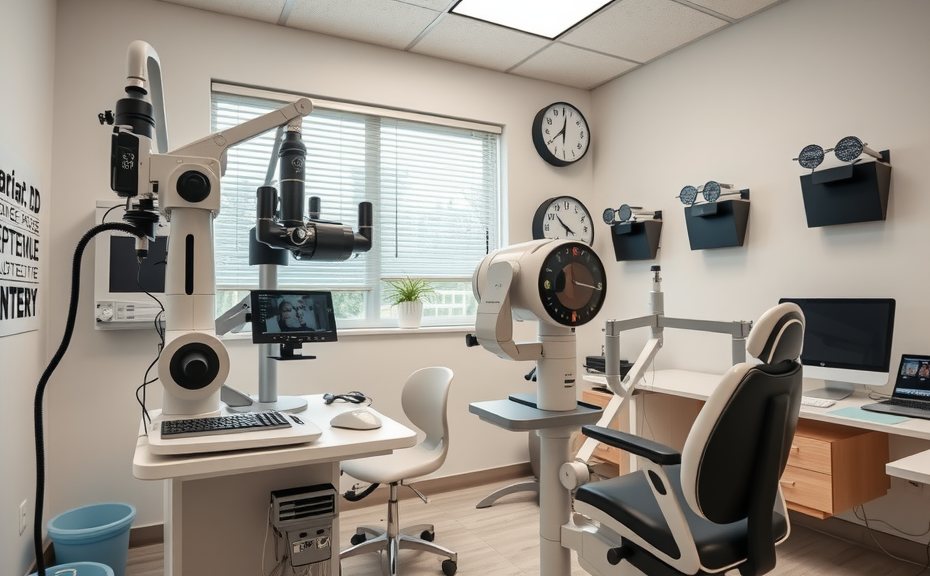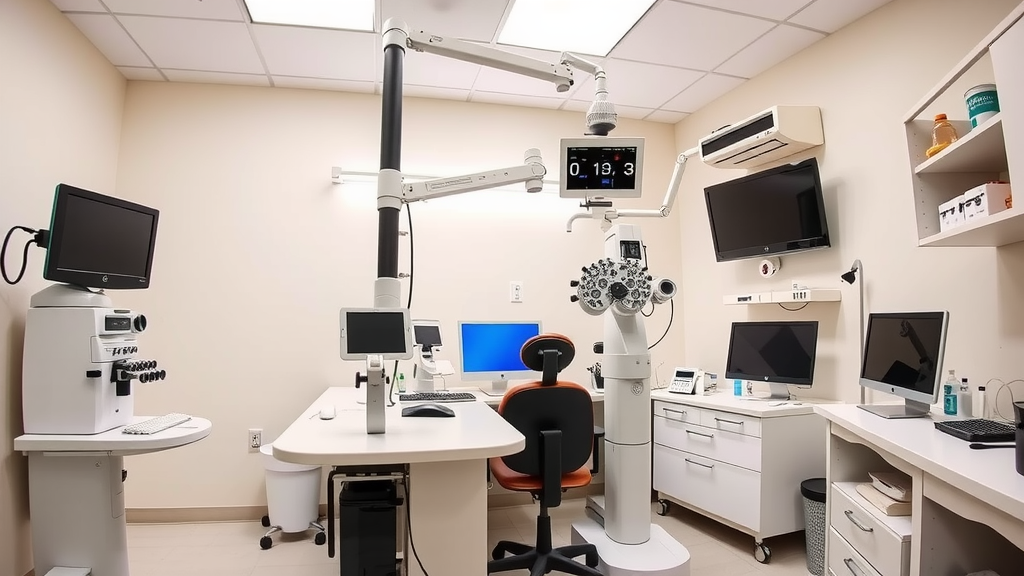Vision health is a significant aspect of overall well-being, and professionals within this field play a pivotal role in maintaining ocular function. Optometrists complete rigorous training, which typically involves a four-year doctoral program following their undergraduate studies.
This comprehensive education prepares them to diagnose and treat a variety of eye conditions while promoting optimal visual acuity.
An interesting fact is that a survey indicated nearly 90% of patients express satisfaction with their eye care services, reflecting the trust and confidence these professionals inspire.
Despite their expertise, myths about the scope of their roles persist, affecting public perception and knowledge surrounding the optometric practice.
Understanding The Professional Reputation Of Optometrists
Perceptions of eye care professionals often hinge on multiple elements that shape their standing in the community. Quality of care ranks high among these factors; research shows that patient satisfaction is significantly linked to thorough eye exams and tailored treatment strategies.
The education and qualifications of vision specialists are equally noteworthy, as varying levels of training among practitioners can affect their credibility and perceived expertise.
Communication skills play a pivotal role, too, as effective dialogue helps dispel common misconceptions about eye health, ultimately fostering trust with patients.
Membership in reputable professional organizations can bolster the professional reputation of an optometrist, as strict adherence to ethical guidelines is integral to cultivating confidence among patients.
How Do Optometrists Ensure Patient Trust
Establishing a strong rapport with patients is fundamental for professionals in the optical industry. Effective communication involves providing clear, detailed explanations regarding various procedures and treatment options.
This openness fosters an environment where patients feel encouraged to ask questions, which deepens their understanding and comfort throughout the process.
Demonstrating expertise is accomplished through continuous education, enabling eye health professionals to stay informed about advancements within their field.
Many optometrists prominently display their qualifications, further enhancing their credibility with patients.
Creating a comfortable environment is another significant factor in promoting patient satisfaction; aspects such as the office layout and the demeanor of staff contribute greatly to this experience.
Offering personalized care—like customized treatment plans and consistent follow-up—helps to strengthen long-term relationships. These strategies collectively reinforce the trust necessary for successful optometrist qualifications, enhancing patient satisfaction and supporting the licensing authority and the optical industry in their efforts.
Patient Rapport in the Optical Industry
- Effective communication can improve patient understanding and comfort during procedures.
- Continuous education helps eye health professionals stay updated on advancements in their field.
- A comfortable office environment and friendly staff enhance overall patient satisfaction.
- Personalized care, including customized treatment plans, fosters long-term patient relationships.
The Role Of Optometric Practice In Healthcare
Eye health significantly impacts overall well-being, with vision serving as a critical sense that influences daily life. Comprehensive assessments conducted by practitioners can unveil indicators of systemic diseases, such as diabetes and hypertension, enhancing community perception of the importance of routine eye care.
These assessments go beyond merely checking visual acuity; they include detailed evaluations of ocular health, allowing for the early detection of refractive errors and other conditions.
Patient education is a fundamental aspect of their role, as it empowers individuals to understand the significance of maintaining eye health and encourages them to engage in preventive practices.
Collaborative efforts with other healthcare providers exemplify their commitment to an interdisciplinary approach, ensuring that care is not only effective but holistic, addressing the broader aspects of patient health.
Key Qualifications For Trusted Optometrists
Establishing credibility in the healthcare field involves a distinct combination of qualifications for professionals in vision care. Educational Background plays a key role; an optometrist must earn a Doctor of Optometry (OD) degree from an accredited institution, followed by clinical rotations where they gain practical experience in managing ocular health.
Licensure and Certification are vital components of professional trust.
Each practitioner is required to obtain state licensure, ensuring adherence to regulatory standards set forth by healthcare authorities.
A board certification further emphasizes a commitment to continuing education and maintaining high standards in disease management practices.
Specialized Training enhances an optometrist’s skill set, focusing on areas such as pediatric optometry or specific treatment techniques for corrective lenses, thus reinforcing their expertise. Professional contact lenses and corrective lenses play a crucial role in ocular health, shaping public perception and enhancing disease management.
Healthcare Credibility in Vision Care
- Optometrists must complete a Doctor of Optometry (OD) degree from an accredited institution.
- State licensure ensures adherence to regulatory standards and protects patient safety.
- Board certification indicates a commitment to ongoing education and high standards in disease management.
- Specialized training in areas like pediatric optometry enhances the skill set of practitioners.
Community Perception: Do Patients Trust Optometrists
Effective communication between patients and their eye care providers fosters a sense of reliability essential for positive health outcomes. Many individuals often seek patient referrals from acquaintances when selecting an optometrist.
Research shows that around 75% of people feel personal endorsements greatly impact their choices.
The perception of optometrists as more approachable compared to general practitioners significantly contributes to this trust.
Enhanced accessibility during routine checkups typically results in greater comfort, which nurtures a trusting relationship over time. The role of professional associations in enforcing rigorous standards can also bolster patient confidence regarding their optometrist’s qualifications
Ethical Standards In Eye Care Practices
Establishing strong principles in optometry is fundamental for maintaining high standards of patient care. These guidelines shape how practitioners approach their responsibilities, focusing on beneficence, non-maleficence, and justice.
For instance, prioritizing preventive care strategies can significantly enhance long-term vision health.
Leading organizations like the American Optometric Association provide a structured ethical framework to guide professionals in their practice.
An intriguing aspect is the commitment of many optometrists to ongoing professional development, which equips them to handle complex ethical dilemmas effectively. Maintaining patient confidentiality and obtaining informed consent form the backbone of ethical practices, reinforcing trust within the community and ultimately improving patient outcomes.
By adhering to these practices, optometrists can ensure that their approach not only aligns with ethical standards but also with the rising expectations of a well-informed patient base.
Optometry Ethics
- Adhering to principles such as beneficence and non-maleficence enhances patient trust and care quality.
- Preventive care strategies can lead to a significant reduction in long-term vision problems.
- Ongoing professional development helps optometrists navigate complex ethical dilemmas effectively.
- Maintaining patient confidentiality is essential for reinforcing trust and improving overall patient outcomes.
How Do Patient Outcomes Influence Respect
The effectiveness of healthcare services plays a significant role in shaping patient perceptions of their providers. Evidence suggests that positive experiences during glaucoma screening and cataract evaluation can lead to heightened levels of trust and respect.
A study showed that 78% of patients reported increased satisfaction when they experienced timely and successful treatment, reinforcing the importance of efficient care delivery.
Patients are also more inclined to recommend providers who consistently demonstrate favorable results in their procedures.
The significance of long-term follow-up success rates cannot be overlooked, as many individuals value ongoing support and communication. This linkage highlights the necessity for professional development among healthcare providers, particularly within the domain of vision science, to uphold respect and esteem in the healthcare community.
Transitioning to the next dimension, the role of professional associations plays an equally important part in establishing the credibility of optometrists within the landscape of patient care.
The Impact Of Professional Associations On Optometrists Credibility
The role of professional organizations significantly enhances the credibility attributed to practitioners in the optical field. These entities provide a wealth of resources, enabling optometrists to expand their skill sets through access to educational material on diagnostic equipment and contemporary best practices.
Membership often reflects a dedication to ethical standards, which is essential for maintaining patient-centered care.
Research indicates that optometrists associated with recognized organizations are often seen as more reliable by patients, thereby fostering a sense of trust.
These associations play a pivotal role in advocating for advancements in low vision rehabilitation, which can lead to improved patient outcomes. Active participation in such groups not only elevates an optometrist’s reputation within the community but also enhances health literacy, ensuring that patients are better informed about their vision correction options.
Continuous involvement signals a commitment to professional growth and reinforces the trust placed in optometrists by the public.
With advancements in diagnostic equipment, vision correction, low vision rehabilitation, patient-centered care, and improved health literacy, we can enhance the quality of life for individuals facing visual impairments.
Professional Organizations in Optometry
- Membership in professional organizations enhances the credibility of optometrists among patients.
- Access to educational resources allows optometrists to stay updated on best practices and diagnostic equipment.
- Optometrists affiliated with recognized organizations are perceived as more trustworthy by patients.
- Active participation in these organizations promotes advancements in low vision rehabilitation, improving patient outcomes.

